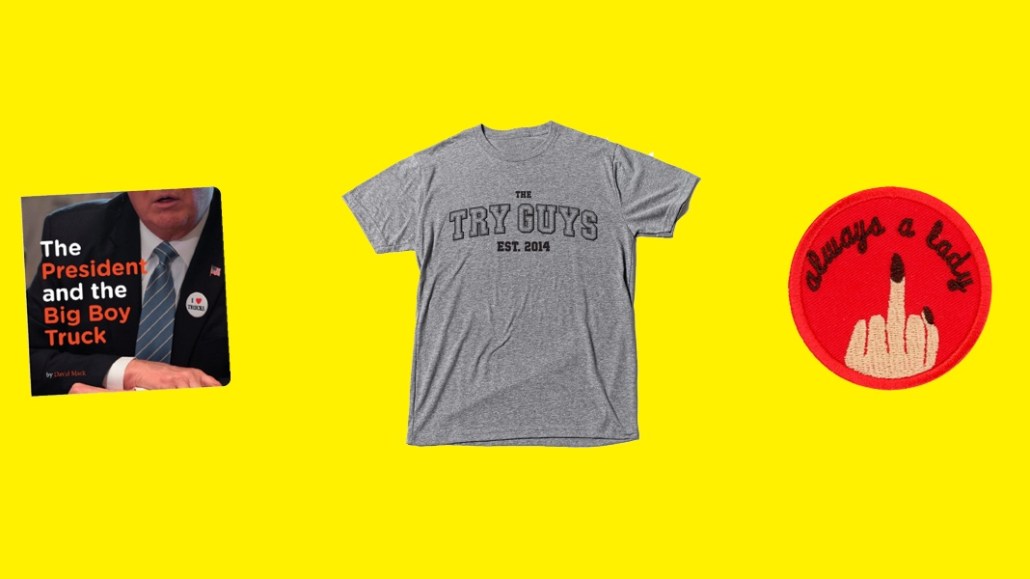Secure your place at the Digiday Media Buying Summit in Nashville, March 2-4
‘Leave no strategy untested’: How BuzzFeed is pushing into commerce with a 12-person team

For many publishers, doing commerce means salting one’s content with affiliate links. For BuzzFeed, it means grabbing an idea from a Facebook comment, turning it into a product ready to ship within two days, and moving thousands of units of said product in less than a week.
That’s an extreme example (more on this later), but BuzzFeed appears to have figured some things out on the e-commerce front. Six months ago, it acquired the company that became Product Labs. Since then, BuzzFeed has doubled that team’s headcount to a dozen, produced a best-selling cookbook, forged a partnership with the “Today” show and used Facebook audience data to develop whole lines of products: After starting out with a handful of candles, there are now over 55 different candles, oils and cutting boards in a fast-growing Homesick collection.
“We’re basically leaving no strategy untested,” said Ben Kaufman, BuzzFeed Product Labs’ head.
A lot of publishers have dabbled in e-commerce, though few have gone deeper than setting up affiliate links and lead generation. BuzzFeed has an affiliate business too, called BuzzFeed Markets. But since Kaufman’s arrival, it’s gotten into the more complicated and riskier work of actually manufacturing, selling and shipping goods, albeit in ways that are as efficient as possible. In the past six months, BuzzFeed has hired warehouse management, checkout technology and customer-acquisition specialists — not your typical publishing roles, and far beyond affiliate links.
“We definitely have a big affiliate strategy,” Kaufman said. “But we also realized that our editorial sensibility and identity-based content can lend itself to physical goods, too.”
The core of this idea – developing, then selling products that a community’s already clamoring for – is not dissimilar to what Kaufman sought to do at his old startup Quirky, which was supposed to source ideas from a community, then develop, market and ship them in record time (it also burned through $180 million in venture capital before collapsing into bankruptcy).
So far, BuzzFeed is being a lot leaner and low-risk: Many of the wares in its various stores are things BuzzFeed licenses or buys from third parties, and its elastic supply chains are cobbled together from third-party providers. By Kaufman’s count, BuzzFeed Product Labs has bought finished goods from upwards of two dozen different vendors.
But BuzzFeed’s also gotten better at standing up products that it can sell, on demand, on short notice. That aforementioned product, a children’s book called“The President and the Big Boy Truck,” started out as a listicle written by a BuzzFeed News reporter, David Mack. After it had been shared on Facebook, a reader there suggested it would make a book in a comment. After that suggestion got “liked” into a top comment, BuzzFeed publisher Dao Nguyen passed the idea along to Kaufman, and thanks to a relationship with an on-demand book printer it had worked with on another product, the book was available right away.
While Facebook doesn’t always serve up ideas that literally, it has become a vital information source for the team. The roll-out of their Homesick candles, for example, was informed by insights Kaufman gleaned by looking at Facebook’s audience data. To date, they’ve manufactured more than 50 kinds of the candles, and they roll out a new scent “every few days,” Kaufman said.
They’re able to do this because of BuzzFeed’s commitment to building its audience across platforms. It’s easy to make an informed decision about an audience, for example, when one has nearly 10 million fans on a platform. “One of the biggest challenges in retail is getting an audience,” said Christina DiRusso, Product Labs’ head of marketing. “But the beautiful thing is, we have an audience. We’re reverse-engineering that process.”
From an operational standpoint, Product Labs is still a ways away from being finished. Because they’re leery of outsourcing customer service, for example, Kaufman himself still helps out with customer service emails. And while they’ve had a few hits, they’ve hardly devised some kind of magic formula for rolling out guaranteed big sellers. “If we knew what was gonna sell, we’d be Walmart,” Kaufman said. “We’ve still got a lot to learn.”
More in Media

From feeds to streets: How mega influencer Haley Baylee is diversifying beyond platform algorithms
Kalil is partnering with LinkNYC to take her social media content into the real world and the streets of NYC.

‘A brand trip’: How the creator economy showed up at this year’s Super Bowl
Super Bowl 2026 had more on-the-ground brand activations and creator participation than ever, showcasing how it’s become a massive IRL moment for the creator economy.

Media Briefing: Turning scraped content into paid assets — Amazon and Microsoft build AI marketplaces
Amazon plans an AI content marketplace to join Microsoft’s efforts and pay publishers — but it relies on AI com stop scraping for free.








